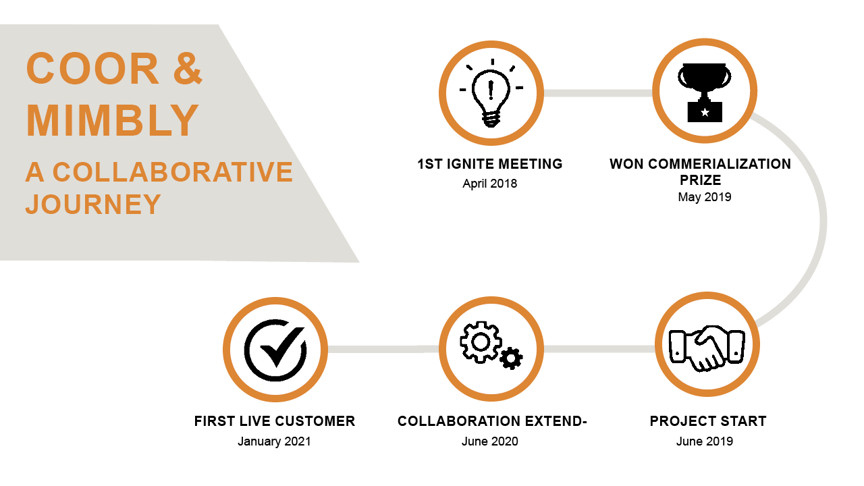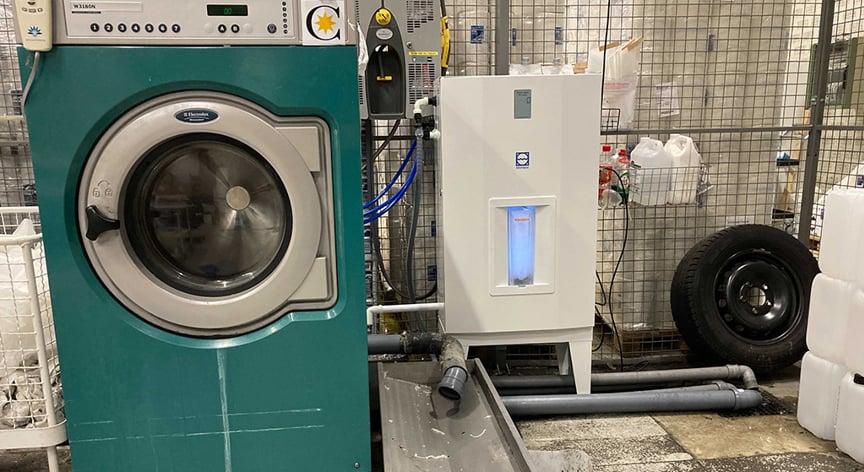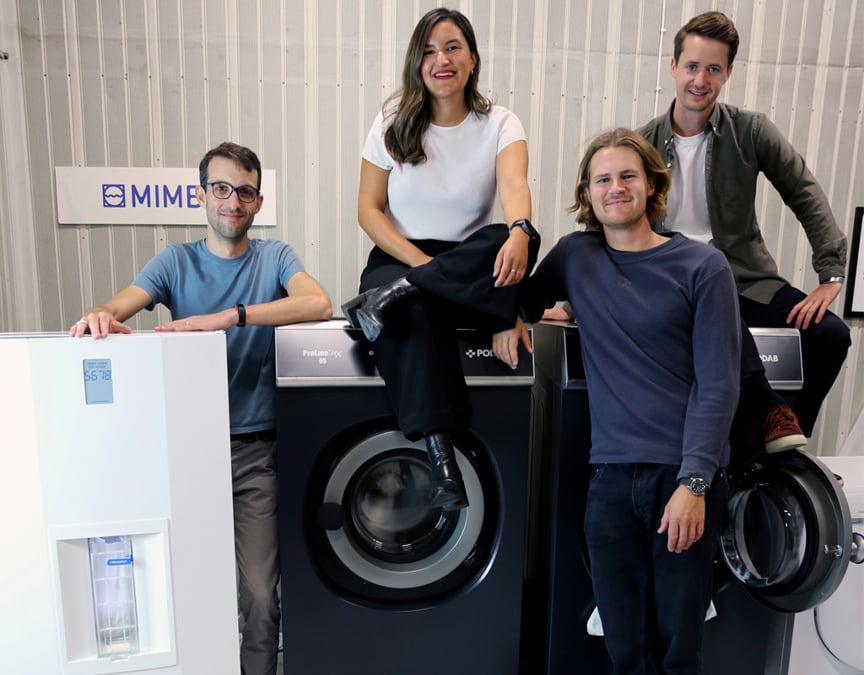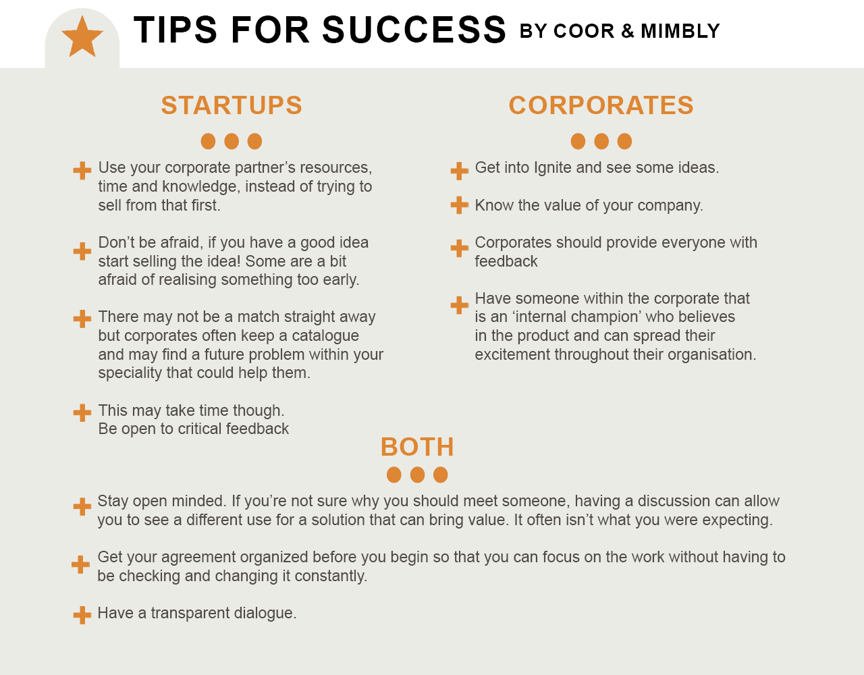Collaboration
How Coor and Mimbly gain a competitive edge
A great idea and early stage product brought Mimbly and Coor together when they won the Kommersialiseringspriset in 2019. Beginning this pilot project at such an early stage allowed both companies to gain a competitive edge and further develop a more sustainable way to do laundry.

Starting as a student project at Chalmers University of Technology in Gothenburg in 2017, Mimbly focuses on creating solutions to make laundry more sustainable. Their first ever matchmaking meeting through Ignite was with facility management company, Coor. This eventually resulted in them working together to further develop the Mimbox which aims to reduce water consumption by up to 70%.
“By collaborating with startups we gain access to their technology before our competitors. We do this because we want to be the most innovative facility management company on the market. Without Ignite Sweden we would have never been able to meet them. And it is in that meeting the imagination sparks and you have an “aha moment,” says Stefan Sernefors, Specialist, Cleaning at Coor.
After a successful first year, the collaboration has now entered a new stage with a more producible version of the Mimbox recently installed at one of Coor’s customer sites in Gothenburg.

Starting the Collaboration With a Win
Although they met at the Innovationsriksdagen in Borås in 2018, their collaboration didn’t begin until a year later when Mimbly was awarded the 2019 Kommersialiseringspriset (Commercialization prize) by the Swedish Energy Agency, InnoEnergy and Ignite Sweden. This prize, awarded at the Power Circle Summit, allowed them to begin a one year pilot project in June 2019 at Coor’s head office in Kista.
The resulting pilot aimed to further develop and test Mimbly’s add-on product for washing machines called the Mimbox. Coor’s extensive cleaning services and key focus on improving environmental sustainability was a large incentive for them to collaborate with Mimbly. The Mimbox addresses some key environmental challenges including water wastage, energy efficiency and microplastics and during its early stages already recycled over 5000 litres of water. Their later stage model can now save 1600 litres in just one week.
“We are looking for new solutions that are able to cope with these environmental issues. We love new innovations and in this particular case they addressed three major issues within cleaning. The washing of microfiber cloths and mops produce enormous amounts of microplastics and to have a way of securing them from entering our sewers is perhaps the most critical thing to not getting it banned like plastic bags,” says Stefan.

Gaining a Competitive Advantage
Innovations such as the Mimbox allow Coor to help their customers become more innovative and reach their sustainability goals. These important factors drove Coor to work with Mimbly while it was still in its testing phase.
“We work with startups because we want to be the most innovative company in our sector. Testing new products before they are available in the market is a huge advantage. We see from our customer satisfaction index that our customer like us for our innovative solutions. We can also see from our portfolio that our customers stay longer because not only are they getting a product that is working through Coor, but they don't need to look elsewhere because they will get development through us,” says Stefan.
However, this early stage cooperation doesn’t just benefit Coor. CEO of Mimbly, Isabella Palmgren says that for Mimbly, testing the solution at Coor’s head office helped them address any technical issues at an earlier stage.
Beyond the advantage of implementing new technology first, Coor believes that joining the process early allows them to influence the development to better suit their needs.
“It is important for us to understand how a product is supposed to work. We need to assess if we need staff onsite to follow up or what maintenance it might require. If we get involved early on in a process, we can affect the finished product to better fit our needs. We can also develop processes and package it into a service that works from day one. That wouldn't be the case if we just bought a finished product,” says Stefan.
The Challenges of Early Stage Development
Beginning a collaboration at an early stage has many benefits but there is also some added risk that can slow the process down and bring challenges that don’t occur when engaging with a more finished product. This was one of the reasons why it took a year before the project began according to Stefan.
“Washing for us is a very critical process, if that doesn’t work, an entire contract could stand still, so we had to make sure that this was something we believed in and find the correct contract to test it on. One thing to consider is the risk of failure and what happens if something fails. Another thing is to ask if there is any interest locally. Do we have a customer that believes in it? Because if we are at our customer’s location, they must buy in on it. And probably most importantly, are there people at the site that are willing to train and make it a success? We needed people who were really interested and had an emotional buy in to make it work but also be aware that it is just a prototype, it's not a finished product, it is a journey, “ says Stefan.
There is also a learning curve when finding the right focus for the product and adapting to technical challenges but these can be tackled in a positive way with close collaboration according Isabella.
“Coor’s needs have changed over time. We first pitched water recycling, energy saving and the Mimbox with a focus on microplastics but when we started the collaboration, we focused mostly on microplastics and filtration because their mops released much more fiber than we had expected,” says Isabella.

Open Communication a Key to Continued Success
Stefan sees this process as a positive thing and says that open communication has helped solve these issues.
“In a process like this, there will always be questions or challenges that you need to solve along the way and you need to have a direct dialogue. It’s better to have errors come up now rather than later, “ says Stefan.
This close collaboration and open communication has been extremely important to the success of the pilot project and both companies have maintained close contact to share knowledge and address any issues they’ve found.
“It’s always good to work very closely with a customer. We get a lot more insight into their needs, how they think and what is valuable to them. The cooperation has been great, it could not have gone better. They are very positive and are always encouraging us to test more. Even if there have been hiccups for any reason, they have always been positive about finding solutions,” says Isabella.
Things are now moving forward with the project, and with investors as well as funding from the EU and the Swedish Energy Agency, the Mimbox has developed into a more producible product. This more mature prototype will be tested for the next three to six months at a car manufacturing company in Gothenburg.
“The investments helped us go from prototypes that we built completely ourselves, to actually finding a production partner that helps us make producible prototypes that work a lot better. Now the Mimbox is supposed to work without us having to be there everyday to check it. It's also connected to a platform where you can see your savings, which we will share with Coor and they can share it with their customer,” says Isabella.
“Now the prototype looks more like the planned finished product, but that means it's harder to make large changes, now it’s more fixed to a standard, so that's a big thing. But, that's also why we dare to test it on one of our large customers. The product is live and they expect it to work. The development never stops, but right now we are in a phase where we actively can present and pitch Mimbly’s products in tenders to large potential customers. If we have a potential customer who we know sustainability issues are very high priority, we can try to equip them with a toolbox that is unique for Coor,” says Stefan.

About Ignite Sweden
Ignite Sweden is a non-profit initiative that aims to foster innovation and accelerate commercialization by connecting startups to large companies and public organizations.
Since its start in spring 2017, Ignite has organized matchmaking events all over Sweden connecting 648 startups with 216 corporates, resulting in 3602 meetings and most importantly 230+ commercial collaborations.
Ignite Sweden is a program led by Kista Science City, THINGS, STING, LEAD, MINC, Sahlgrenska Science Park and Uminova, and coordinated by SISP - Swedish Incubators & Science Parks. Ignite is co-funded by Vinnova, Energimyndigheten and Tillväxtverket.
Read more on Ignite on its website: https://ignitesweden.org/